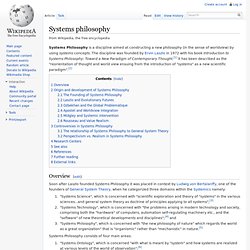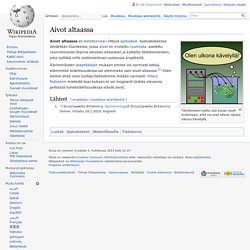

Good Reason - Metayliopisto.fi on nyt auki tiedonjanoisille. Mikä ero on filosofilla ja IT-ammattilaisella? Edellisellä on pää pilvissä totuutta etsimässä ja jälkimmäisellä... Good Reason - Metayliopisto.fi on nousemassa ”harjakorkeuteen” Pääsivu - metayliopisto. Systems philosophy. Systems Philosophy is a discipline aimed at constructing a new philosophy (in the sense of worldview) by using systems concepts.

The discipline was founded by Ervin Laszlo in 1972 with his book Introduction to Systems Philosophy: Toward a New Paradigm of Contemporary Thought.[1] It has been described as the "reorientation of thought and world view ensuing from the introduction of "systems" as a new scientific paradigm".[2] Overview[edit] Soon after Laszlo founded Systems Philosophy it was placed in context by Ludwig von Bertalanffy, one of the founders of General System Theory, when he categorized three domains within the Systemics namely: Systems Philosophy consists of four main areas: The term "Systems Philosophy" is often used as a convenient shorthand to refer to "the philosophy of systems" (e.g. here), but this usage can be misleading. Origin and development of Systems Philosophy[edit] The Founding of Systems Philosophy[edit] Laszlo and Evolutionary Futures[edit] Perspectivism vs. Venäjän talous ja termodynamiikan alkeet - metayliopisto.
On vaikea kuvitella yhteyttä termodynamiikan ja talouden välille, mutta systeemeitä on vuosikymmenet kuvattu tämän fysiikan haaran avulla ja kun talous on systeemi, silloin pitäisi olla yhteys Venäjänkin taloudesta termodynamiikkaan, ainakin teoriassa.

Venäjän talouden ongelmia nuori ekono misti, Zukovski, rajasi selkeään tapaan kolmi-dimensioisesti (Hesari): a) suhdannekriisib) rakennekriisi jac) järjestelmäkriisi. Suhdanneongelma on hänen mielestään suureksi osaksi maan sisältä aiheutuvaa, mutta rakennekriisi johtuisi putkitaloudesta kun öljyrahat ja -voitot sijoitettu kiinteistöihin ja hotelleihin, eikä omaa alaansa vahvistamaan. Se on lyhytnäköisyyttä. Systeemikriisi on Venäjällä Zukovskin mukaan vaikein, vaarallisin, syvin ja suurin, koska sitä ei voida ratkaista talouden keinoin. Omistusrakenteiden muuttaminen edellyttäisi keskusjohtoisia muutoksia lainsäädännöllä tai jonkin sorttista vallankumousta tai uudelleenorganisaointia. Miten tämä liittyy termodynamiikkaan? What is Management Cybernetics? Cybernetics, according to Stafford Beer, is the science of effective organization.

Clear as mud, you say! For example, a bacterium that was not effectively organized would quickly die. An ecosystem that was not effectively organized would very shortly be something else. A poorly organized human nervous system would not be able to regulate breathing, heart rate, speech, vision, etc. etc. etc. A poorly organized computer operating system would frequently crash and might have lots of security issues (sounds sort of like Windows, doesn’t it … sorry, as a devoted Mac user I couldn’t resist that one. Effective organization is the basic requirement for the survival of a complex system. What makes something a “complex system”? “Complex system” is hard to define precisely but a common sense definition will do for now.
Restating our original definition we might say that cybernetics is the science of effective organization for complex systems. Here are the 22 laws, principles and theorems. 1. 2. 3. Albert Einstein Mind Map. Albert Einstein Everything should be made as simple as possible, but not one bit simpler.

" How could I simplify this? "Anyone who has never made a mistake has never tried anything new. " Show No Fear What could I learn from this mistake? How does this benefit me? Technopreneurship: Think Like an Engineer on openlearning.com. Aivot altaassa. Tietokoneen syöte saa kuvan aivot luulemaan, että ne ovat altaan sijasta ulkona kävelyllä.

Aivot altaassa on tietoteoriaan liittyvä ajatuskoe. Ajatuskokeessa lähdetään tilanteesta, jossa aivot on irrotettu ruumiista, asetettu ravinneliuosta täynnä olevaan altaaseen ja kytketty tietokoneeseen, joka syöttää niille aistimaailmaa vastaavia ärsykkeitä. Äärimmäisten skeptikkojen mukaan emme voi varmasti tietää, elämmekö todellisuudessa vai olemmeko vain aivot altaassa.[1] Siten emme ehkä voisi luottaa tietävämme mitään varmasti. Hilary Putnamin mielestä taas kukaan ei voi loogisesti todeta olevansa pelkässä lumetodellisuudessa elävät aivot. Jump up ↑ Encyclopædia Britannica: Epistemology Encyclopædia Britannica Online.
Facebook - ryhmä Metayliopisto. Twitter-viestejä. Metauniversity.net. Videot.